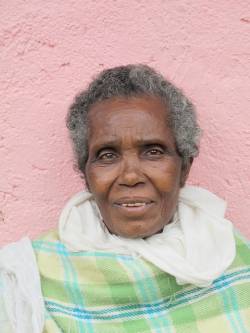 I’ve recently returned from Ethiopia, where the first field test of the Rapid Assessment Method for older people (RAM-OP) has been completed in Addis Ababa.
I’ve recently returned from Ethiopia, where the first field test of the Rapid Assessment Method for older people (RAM-OP) has been completed in Addis Ababa.
RAM-OP is an innovative method of assessing the nutritional needs of older people in emergencies that could offer a quicker, less expensive alternative to the SMART (Standardized Monitoring and Assessment of Relief and Transitions) methodology, which is in wide use in the humanitarian sector.
Testing nutrition in urban contexts
To carry out the test, we recruited and trained 14 enumerators and two data entry clerks. We then conducted two surveys in Kolfe Keranyio, a sub-city of Addis Ababa: One survey with the RAM-OP, and one survey using the SMART methodology.
We chose Kolfe Keranyio because we wanted to test RAM-OP in an urban context, and because HelpAge has worked in this area with a local partner, Tesfa Social and Development Association (TDSA).
Kolfe Keranyio has a population of 428,895 according to the 2007 census, 7.4% of whom are aged 50 and over. It hosts very mixed communities, from the very poor to the very well-off. It also has a variety of areas, from rural to highly urbanised.
Interviewing older people
The enumerators were trained on field procedures, administering a questionnaire related to a set of indicators (such as the hunger scale, the diet diversity score, the Katz Index of Independence in Activities of Daily Living, etc…) and measuring older people’s middle upper arm circumference (MUAC), which is the best indicator of older people’s nutritional status. For eight days, they went knocking on doors, interviewing and measuring people from the age of 50.
A total of 889 people were interviewed, aged between 50 and 102, and including 568 women. Preliminary results show that the global malnutrition rate is between 2.6 and 7.0%, which is not negligible, however not high enough to reach crisis levels.
New tool is faster and cheaper
The RAM-OP survey, with a sample of 20 primary sampling units of 12 people, was definitely faster and cheaper to implement than SMART, with a sample of 30 clusters of 23 people. The comparison of the results is being analysed, and will be published very soon.
The next step is to test RAM-OP versus SMART in a rural context, which will probably take place in a district of Turkana County in Kenya in May 2014.
The Rapid Assessment Method for Older People (RAM-OP) project is funded by the Humanitarian Innovation Fund.
Read more about HelpAge’s work to ensure older people are included in humanitarian responses.
